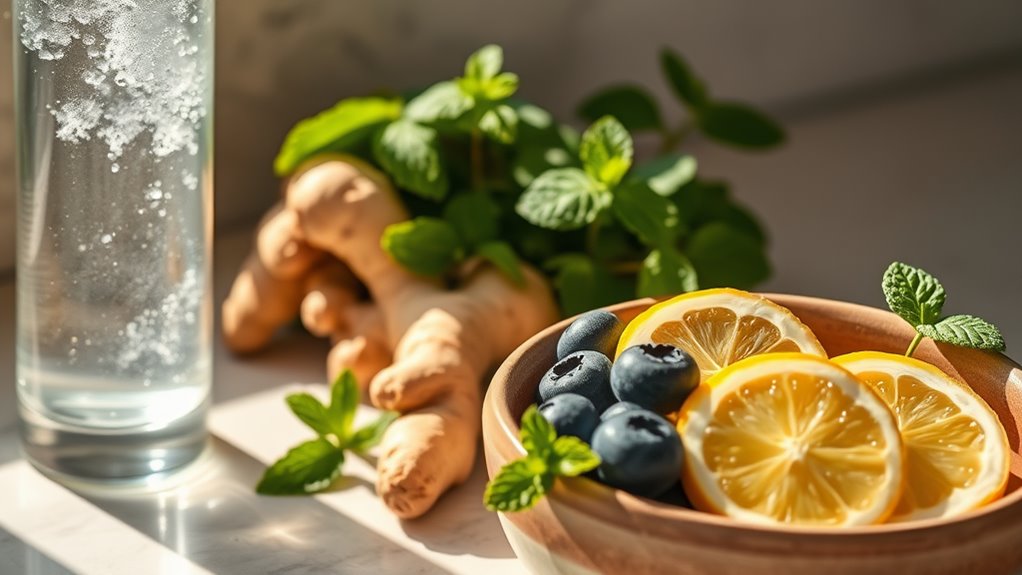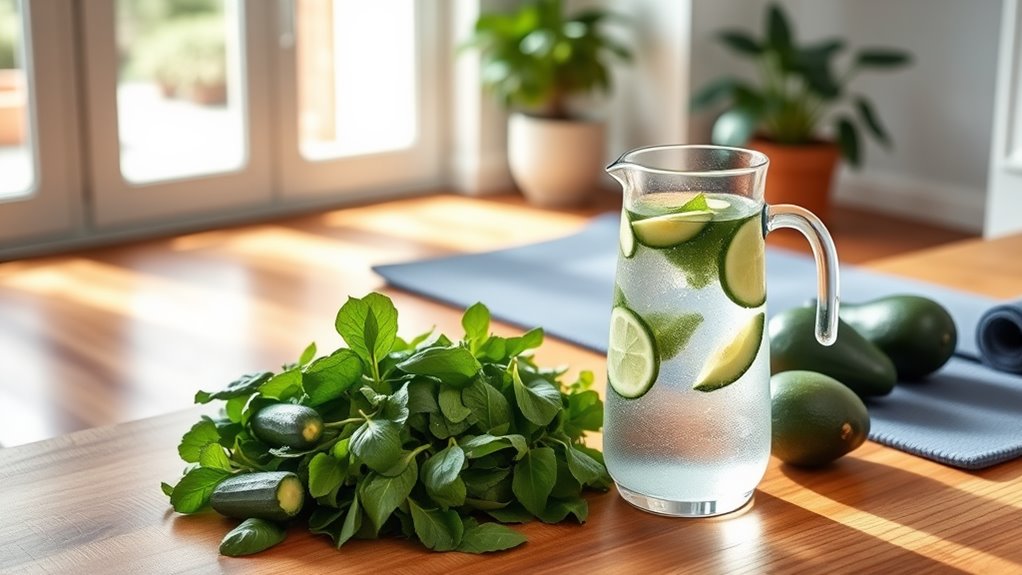Constipation Relief That’s Natural and Fast
Constipation can feel like a never-ending battle, leaving you frustrated and uncomfortable. But don’t worry, relief is closer than you think. By making a few simple changes to your diet and lifestyle, you can promote regularity naturally and quickly. Curious about the best strategies to get your digestion back on track? Let’s explore some effective approaches that can help you feel better in no time.
Key Takeaways
- Increase fiber intake by consuming whole grains, fruits, vegetables, and legumes to promote healthy bowel movements naturally.
- Stay hydrated by drinking at least eight 8-ounce glasses of water daily to help soften stools and encourage regularity.
- Incorporate natural supplements like psyllium husk, flaxseed, and magnesium citrate to boost fiber intake and relax the intestines.
- Engage in regular physical activity, such as walking or yoga, to stimulate digestion and improve bowel motility.
- Consider herbal remedies like senna or aloe vera, but consult a healthcare professional before use to ensure safety and effectiveness.
Understanding Constipation: Causes and Symptoms
Constipation can feel like a frustrating roadblock in your daily routine, making it essential to understand its causes and symptoms. You might experience infrequent bowel movements, hard stools, or a feeling of incomplete evacuation.
Common causes include a low-fiber diet, inactivity, and certain medications. Regular physical activity and stress management can also contribute to your discomfort. Identifying these triggers is key to finding effective constipation remedies. Increasing fiber intake through fruits, vegetables, and whole grains can help promote regularity. Additionally, staying active and managing stress levels can make a significant difference. Incorporating high-fiber foods into your diet can further enhance digestive health and alleviate constipation.
Hydration: The Key to Easing Constipation
Staying properly hydrated is vital for your digestive health and can greatly ease constipation.
When you drink enough water, it helps soften your stool and promotes regular bowel movements.
Importance of Water Intake
While it might seem like a simple solution, ensuring adequate water intake is essential for maintaining regular bowel movements and easing constipation.
When you’re properly hydrated, your body can soften stool, making it easier to pass. Studies show that drinking enough water not only helps maintain the consistency of stool but also promotes efficient digestion.
Aim for at least eight 8-ounce glasses of water daily, but adjust based on your activity level and climate. Remember, beverages like herbal teas and water-rich foods can contribute to your hydration.
If you’re struggling with constipation, increasing your water intake might be one of the easiest changes you can make for relief. Stay hydrated, and you’ll likely feel the difference in your digestive health.
Hydration and Digestive Health
Hydration plays a pivotal role in maintaining digestive health, particularly when it comes to easing constipation. When you don’t drink enough water, your body pulls moisture from your colon, leading to harder stools that are difficult to pass.
By staying well-hydrated, you help keep your stools soft and easier to eliminate. Aim for at least eight 8-ounce glasses of water a day, adjusting based on your activity level and climate.
You can also boost hydration through fruits and vegetables, which contain high water content. Remember, caffeine and alcohol can dehydrate you, so balance those with extra water.
Prioritizing hydration not only aids digestion but also supports overall wellness, helping you feel your best every day.
Dietary Changes: Foods That Promote Regularity
When you want to tackle constipation effectively, incorporating specific foods into your diet can make a significant difference. Focus on fiber-rich options that help promote regularity and keep things moving smoothly. Additionally, understanding dietary modifications can further enhance your digestive health.
Here’s a quick guide to some foods that can help:
| Food | Benefits |
|---|---|
| Whole Grains | High in fiber; aids digestion |
| Fruits | Natural laxatives; juicy and fibrous |
| Vegetables | Rich in water and fiber; promotes bulk |
| Legumes | Packed with fiber; supports gut health |
Embrace these foods, and you might just find relief from constipation faster than you think. Remember, a balanced diet can have a powerful impact on your digestive health! Additionally, staying hydrated with herbal teas or water is essential for digestive health.
Natural Supplements and Remedies
Many people turn to natural supplements and remedies for relief from constipation, and for good reason. Options like psyllium husk or flaxseed can boost your fiber intake, promoting regular bowel movements.
Magnesium citrate is another popular choice; it helps relax your intestines and encourages stool movement. Probiotics, such as Lactobacillus and Bifidobacterium, support gut health by balancing your microbiome, which can alleviate constipation.
Herbal remedies like senna or aloe vera may also be effective, but use them cautiously to avoid dependency. Always consult a healthcare professional before starting any supplement, especially if you have underlying health conditions or are pregnant.
With the right approach, these natural solutions can help you find relief swiftly and safely.
Lifestyle Modifications for Digestive Health
To improve your digestive health, it’s crucial to focus on hydration, dietary fiber, and regular physical activity. Drinking enough fluids keeps your digestive system running smoothly, while fiber-rich foods promote healthy bowel movements. Incorporating exercise into your routine not only boosts your overall health but also aids in digestion, helping prevent constipation. Additionally, hydration plays a vital role in breaking down food and absorbing nutrients efficiently. Regular physical activity, such as gentle yoga poses, can also stimulate the digestive system and enhance overall comfort.
Hydration and Fluid Intake
Staying properly hydrated is essential for maintaining digestive health, as a well-functioning digestive system relies on adequate fluid intake to soften stool and promote regular bowel movements.
When you drink enough water, it helps your intestines absorb nutrients efficiently and keeps waste moving through your system. Aim for at least eight 8-ounce glasses of water daily, but remember that individual needs can vary based on factors like activity level and climate.
Additionally, incorporating hydrating foods like fruits and vegetables can boost your fluid intake. If you notice signs of dehydration, such as dry mouth or infrequent urination, increase your fluid consumption.
Dietary Fiber Sources
While hydration plays an essential role in digestive health, dietary fiber is equally important for preventing constipation and promoting regular bowel movements.
Incorporating a variety of fiber sources into your diet can make a significant difference. Opt for fruits like apples, pears, and berries, which provide soluble fiber that softens stool.
Vegetables such as broccoli, carrots, and leafy greens are also excellent choices. Whole grains, including oats, quinoa, and brown rice, offer insoluble fiber that adds bulk to your stool.
Don’t forget legumes like beans and lentils, packed with both types of fiber. Aim for at least 25-30 grams of fiber daily to support your digestive system.
Remember to increase fiber gradually and drink plenty of water to reap the benefits effectively.
Regular Physical Activity
Incorporating regular physical activity into your routine can greatly enhance your digestive health and help combat constipation. Exercise stimulates intestinal contractions, improving the movement of food through your digestive tract. Aim for at least 150 minutes of moderate aerobic activity per week, combined with strength training.
Here’s a quick overview of beneficial exercises:
| Exercise Type | Benefits |
|---|---|
| Walking or Jogging | Increases gut motility |
| Yoga | Reduces stress and tension |
| Cycling | Boosts cardiovascular health |
When to Seek Medical Attention for Constipation
When should you consider seeking medical attention for constipation? If you’ve been experiencing infrequent bowel movements for more than three weeks, it’s time to consult a healthcare professional.
Additionally, if you notice symptoms like severe abdominal pain, blood in your stool, or unintentional weight loss, don’t hesitate to seek help. These could indicate more serious underlying issues, such as bowel obstruction or gastrointestinal disorders.
Even if your constipation improves with home remedies, persistent changes in your bowel habits warrant a doctor’s evaluation.
Remember, it’s better to err on the side of caution. Early intervention can prevent complications and help you find effective relief.
Don’t ignore your body’s signals; prioritize your health and well-being.




